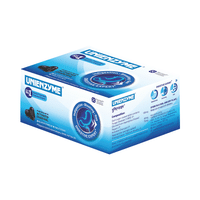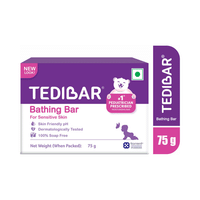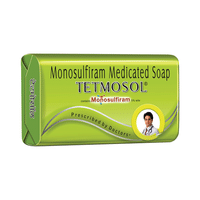Azifran Kit
Rs.96for 1 packet(s) (4 kit each)
food interaction for Azifran
alcohol interaction for Azifran
pregnancy interaction for Azifran
lactation interaction for Azifran
food
alcohol
pregnancy
lactation
Azifran Kit is to be taken with food.
None
None
CAUTION
Consuming alcohol while taking Azifran Kit may cause symptoms such as flushing, increased heart beat, nausea, thirst, chest pain and low blood pressure (Disulfiram reaction).
UNSAFE
Information regarding the use of Azifran Kit during pregnancy is not available. Please consult your doctor.
CONSULT YOUR DOCTOR
Information regarding the use of Azifran Kit during breastfeeding is not available. Please consult your doctor.
CONSULT YOUR DOCTOR
SALT INFORMATION FOR Azifran
Fluconazole(150mg)
Uses
Fluconazole is used in the treatment of fungal infections.
How it works
Fluconazole is an antifungal medication. It kills and stops the growth of the fungi by destroying its cell membrane, thereby treating your skin infection.
Common side effects
Headache, Nausea, Rash, Vomiting, Diarrhea, Abdominal pain, Dizziness, Sleepiness, Taste change, Increased alanine aminotransferase, Increased aspartate aminotransferase, Dyspepsia, Agranulocytosis (deficiency of granulocytes in the blood), Anaphylactic reaction, Torsade de pointes, Acute generalized exanthematous pustulosis, Anemia (low number of red blood cells), Insomnia (difficulty in sleeping), Seizure, Paresthesia (tingling or pricking sensation), Vertigo, Liver failure, Hepatitis (viral infection of liver)
Azithromycin(1000mg)
Uses
Azithromycin is used in the treatment of bacterial infections. It is used in bacterial infections of tonsils, sinus, ear, nose, throat, skin and soft tissues and lungs (pneumonia).
How it works
Azithromycin is an antibiotic. It works by preventing synthesis of essential proteins required by bacteria to carry out vital functions. Thus, it stops the bacteria from growing, and prevents the infection from spreading.
Common side effects
Vomiting, Nausea, Abdominal pain, Diarrhea, Headache, Palpitations, Chest pain, Indigestion, Flatulence, Dark colored stool, Vaginal moniliasis, Vaginal inflammation, Fatigue, Rash, Itching, Photosensitivity, Nephritis, Dizziness, Vertigo, Angioedema (swelling of deeper layers of skin)
Secnidazole(1000mg)
Uses
Secnidazole is used in the treatment of bacterial & parasitic infections. It is used in infections of the brain, reproductive system, gastrointestinal tract, skin, vagina, and other areas of the body.
How it works
Secnidazole is an antibiotic. It kills the bacteria and other microorganisms that cause infections by damaging their DNA.
Common side effects
Headache, Nausea, Vomiting, Diarrhea, Abdominal pain, Vaginal itching, Vaginal yeast infection, Difficulty in swallowing
SUBSTITUTES FOR Azifran
46 Substitutes
46 Substitutes
Sorted By
 Rs. 127pay 412% more per Kit
Rs. 127pay 412% more per Kit Rs. 119.90pay 21% more per Kit
Rs. 119.90pay 21% more per Kit Rs. 97.10save 2% more per Kit
Rs. 97.10save 2% more per Kit Rs. 110pay 346% more per Kit
Rs. 110pay 346% more per Kit Rs. 94.71save 4% more per Kit
Rs. 94.71save 4% more per Kit
Expert advice FOR Azifran
- Your doctor has prescribed Fluconazole to cure your infection and improve symptoms.
- Do not skip any doses and finish the full course of treatment even if you feel better.
- Use a reliable method of contraception to prevent pregnancy while taking this medicine.
- Your doctor may check your liver function before starting treatment and regularly thereafter. Inform your doctor if you notice yellowing of eyes or skin, dark urine, or stomach pain.
- Inform your doctor if you develop severe skin rash such as blistering of skin along with fever.
Frequently asked questions FOR Azifran
Fluconazole
Q. What is Fluconazole used for?
Fluconazole is an antifungal medicine. It is used for the treatment of many fungal infections like Cryptococcal meningitis (fungal infection in the brain) and Coccidioidomycosis (a disease of the lungs). Additionally, it is helpful in the treatment of infections caused by Candida found in the bloodstream, body organs (e.g., heart, lungs) or urinary tract, mucosal thrush (infection affecting the lining of the mouth, throat, and denture sore mouth), and genital thrush (infection of the vagina or penis). It can also be used to treat skin infections like athlete's foot, ringworm, jock itch, nail infection.
Q. Can Fluconazole be taken with oral contraceptives (OCPs) or birth control pills?
Fluconazole has been reported to have a minor interaction when taken with estradiol (a component of oral contraceptives). It can increase the level or effect of estradiol when given along with it. Before starting the treatment with Fluconazole inform your doctor if you are taking birth control pills.
Q. Can Fluconazole cause hair loss?
Fluconazole may cause hair loss as a rare side effect. If during the treatment you experience hair loss, inform your doctor.
Azithromycin
Q. Is Azithromycin safe?
Azithromycin is safe if used at prescribed doses for the prescribed duration as advised by your doctor.
Q. What if I don't get better?
You should inform your doctor if you do not notice any improvement in your symptoms after 3 days of taking Azithromycin. Also, if your symptoms get worse, inform your doctor immediately.
Q. Can the use of Azithromycin cause diarrhea?
Yes, the use of Azithromycin can cause diarrhea. It is an antibiotic which kills the harmful bacteria. However, it also affects the helpful bacteria in your stomach or intestine and causes diarrhea. If you are experiencing severe diarrhea, talk to your doctor about it.
Secnidazole
Q. Is Secnidazole effective?
Secnidazole is effective if used in the dose and duration advised by your doctor. Do not stop taking it even if you see improvement in your condition. If you stop using Secnidazole too early, the symptoms may return or worsen.
Q. What if I forget to take a dose of Secnidazole?
If you forget a dose of Secnidazole, take it as soon as you remember. However, if it is almost time for your next dose, skip the missed dose and take the next scheduled dose in the prescribed time. Do not double the dose to make up for the missed one as this may increase the chances of developing side effects.
Q. Why is it harmful to drink alcohol while using Secnidazole?
Alcohol should be strictly avoided while taking Secnidazole.Moreover, you should avoid alcohol even after 3 days of finishing the complete course. Drinking alcohol can cause an unpleasant reaction (Disulfiram reaction) with symptoms such as stomach pain, nausea, vomiting, headache, flushing or redness of the face.






















